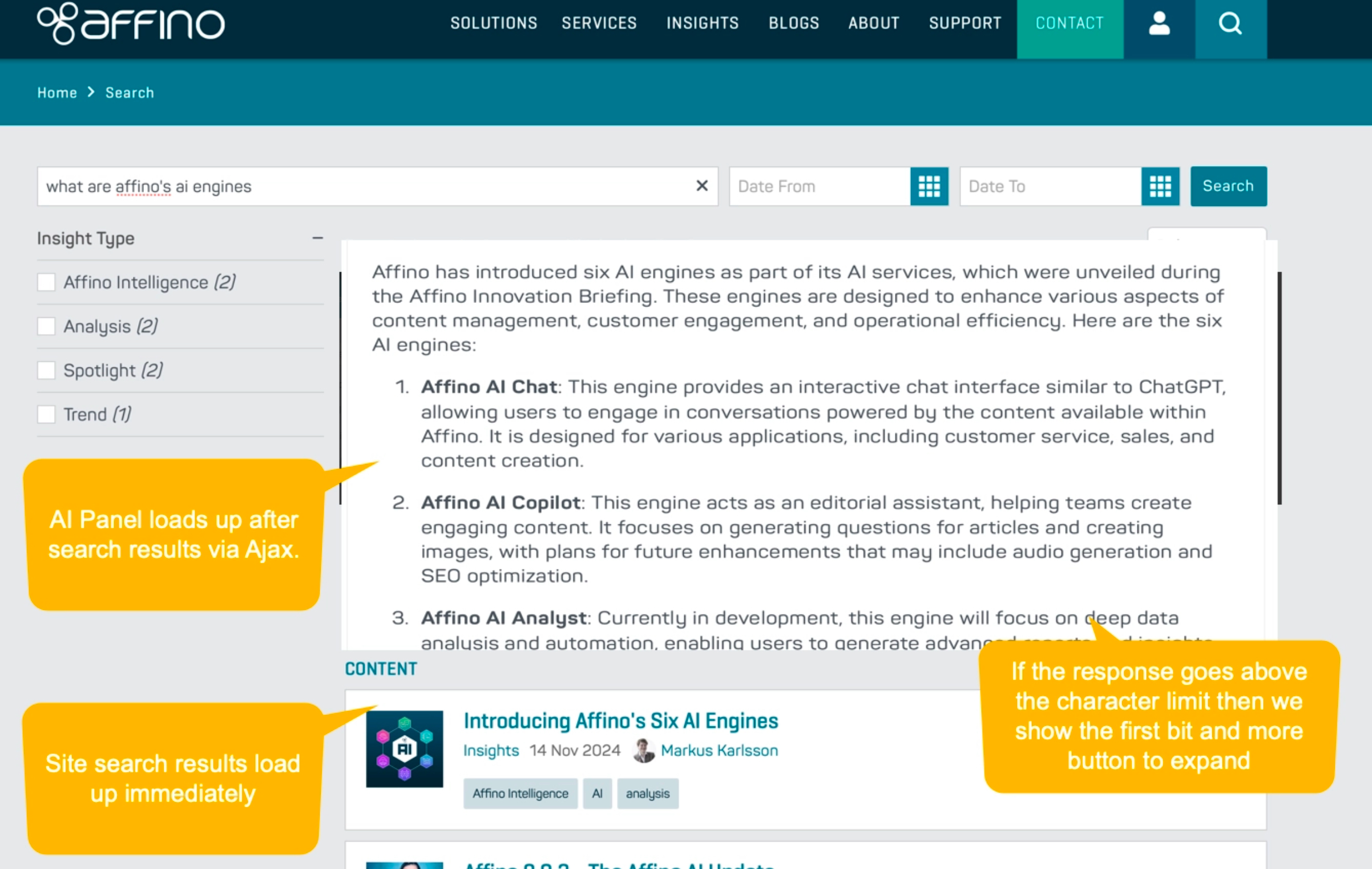 Paul Dominguez
Paul DominguezHi there,
We're all fighting for page views from search traffic in particular. As such it seems we might all benefit from the addition of Structured Data Schema Markup for our article and landing pages.
Seems to be Google's favoured method of data retrieval at the moment, so makes sense that we have the standard tools embedded into our sites.
Is this something you intend to rollout any time soon?
Is there any appetite out there for this from the Affino community?
Thanks
Paul

We have it high on the roadmap Paul, and are starting to see more interest in this area from the community.
There has also been a bit of pushback from brands that don’t simply want their structured content scraped and served up by the big G et al.
There’s a good chance we’ll have more structured data in the next major release, after the one which is just about to come out. We’ll look to make it optional to an extent when we do roll it out.

Hi Markus,
We'd be interested in staying abreast of this as, in particular, we'd like to be able to implement the breadcrumb trail.
We will also be posting events soon and we found the markup useful on our old WP sites to get the events listed

We have been adding snippets to Affino over recent releases, where it is clearcut. Quite a bit of snippet use is more nuanced though, so we are having to look at it one template at a time.
The best place to see this is in the release notes (search for snippets and meta data).
As covered before, this is a bit double edged. The more we surface the meta data, the easier it is going to be for AI's to scrape all your structured content and then simply use your content as the basis of their services, which they in turn sell to others.
Increasingly this will mean that they will likely scrape the site content and then simply not refer the user through
It's why a lot of tech leaders are saying there needs to be some regulation in place, because right now there is no regulation in place if an AI ingests all your content and then simply uses it to provide its own service.

Hi Markus,
In the recent core update we have lost a lot of ground in featured snippets etc and we're being advised that part of the reason is that we're not offering structured data schema markup in the same way some of our competitors are.
Is this on the roadmap at all?

Hi Kevin,
Can you be a bit more specific here, we did add quite a lot of extra meta data over the years here.
There have bee two challenges though:
1) This is a bit of a moving target, as Google changes continuously how it does / doesn't use snippets. In fact we know from conversations with Google that sometimes they use the presence of meta data as a negative to drive down SEO ... something they've continued to do, e.g. with coupons this year.
b) Affino articles owing to their flexibility can cover a lot of content types that some tags simply don't lend themselves to.
There is a c) namely that this meta data is making it easier for AI scrapers to take content wholesale and use it to train AI's.
Is there some specific meta data you want us to focus on here that might be beneficial for you, if so, what is it.

Paul - I have implemented basic schema via Tag Manager targeting specific DOM elements to draw out things like the author name. It took, perhaps, two hours to learn from scratch. It defines it as an article, identifies the author, author url, Title,
Here's one of the results. search.google.com/test/rich-results/result/r%2Farticles?id=5... I've not seen this "live" in search results yet, but perhaps because I applied it only a couple of days ago to a site that is not really ranking highly already. I used it as a live test to see if the process worked.

Markus - FYI. I am increasingly leaning towards allowing our content to appear here. As the alternative, it seems, is to be wiped off the SERPS as position 2 or lower is effectively now below the fold.
Interested to hear others' experiences but we were decimated in last year's core update and the introduction of AI overviews etc.

From what we can see if you're not cited on the AI card for most questions / topics then your referrals will be dramatically affected.
A rule of thumb from what we have seen is that if a page is the top link on Google it gets approx 100x the traffic of the no.2 link, which gets in turn 10x the traffic of the no.3 link. Given that Google will often cite 5 to 10 links on a card, if you're not on the card you might no longer be in the top 10 links on the screen, even if you are at the top of the listing.
This is why we feel GEO has overtaken SEO as the primary focus for promoting site content. It is hard to see otherwise, especially on mobile where already if you were not in the no.1 position you were out of sight.
The bigger challenge is what is done in an environment where Google has a commitment to retain 80% of traffic on its own site and not refer users out.
Sites which have decided to block ChatGPT and Perplexity are also seeing real declines in traffic as users increasingly use those two to find things. Our philosophy is that if you block those and not Google then all you are doing is prioritising Google AI over the others.
So either you make all your content available to all AI's and search engines to increase the likelihood of being cited, but risk the AI's simply using your content to provide their own service
Or you keep it largely / mostly closed to ensure the audience has a reason to sign up for your service, but then need to identify what content or what level of content you make public to drive GEO placement
If you do make more content available to AI's then you have to make sure that your digital experience in turn is elevated so that you are providing something above and beyond simply articles, i.e. adapt many of the new approaches in particular more interactive and creative experiences.

Thanks Markus.
I'm not sure there is a "right" answer at the moment. Only decisions. With the uncertainty that pervades this areas, those decision require a level of conviction based on the information we have.
It is possible that publishers like us might feel that the future of content is so commoditised that our destiny lies in using our content as a platform to promote a more human (less easily replicated) product. Keen to hear other affino users' thoughts and experiences around this.

Gents
Learning as we go here, but I believe ChatGPT search's underlying search data comes from BING, not Google.
If that's right (and I will stand corrected if it's not) then that means we need to be paying attention to the BING search console too.
Simon

Hi Simon,
Yes, this is the case, see below. It might change though depending on the relationship between them, but it feels like OpenAI and Microsoft relationship is here to stay.
Plugging a search engine into an AI and vice versa is a fundamental improvement on just having one or the other.
As a heads up we will be rolling out AI Cards as an option on the Affino Site Search we have found this to be a great step forward in our testing,
—————
Yes, ChatGPT primarily uses Bing for its web search capabilities. OpenAI has partnered with Microsoft to leverage Bing's search infrastructure and index for ChatGPT's web search functionality[1][2][3].
## Key Points:
1. **Bing's Index**: ChatGPT Search relies heavily on Bing's web index. This means that if a page is not indexed by Bing, it won't appear in ChatGPT's search results[2][3].
2. **Search Algorithm**: While ChatGPT uses Bing's index, it employs its own algorithm for ranking and presenting search results. This means that the results may differ from what you'd see directly on Bing[2][3].
3. **Implementation**: The feature, called "Browse with Bing," was initially rolled out to ChatGPT Plus and Enterprise subscribers, with plans to extend it to all users[5].
4. **Data Sharing**: When users search, ChatGPT may share disassociated search queries with Bing. This means that user-specific information (like account IDs or device IDs) is not shared with the search provider[6].
5. **Additional Sources**: While Bing is the primary search provider, ChatGPT also leverages content from direct partnerships with various organizations, including news outlets and data providers[9][11].
It's worth noting that this partnership between OpenAI and Microsoft extends beyond just search functionality. Microsoft has made significant investments in OpenAI, which has led to deeper integration between their technologies[1][4].
Sources
[1] Bing Powers ChatGPT Search www.seroundtable.com/bing-powers-chatgpt-search-38345.html
[2] OpenAI's SearchGPT relies on Bing's index www.thekeyword.co/news/openai-s-chatgpt-search-relies-on-bin...
[3] ChatGPT Search makes Microsoft Bing an SEO priority searchengineland.com/chatgpt-search-microsoft-bing-seo-44801...
[4] ChatGPT will now use Bing as its built-in search provider - Reddit www.reddit.com/r/ChatGPT/comments/13q3jct/chatgpt_will_now_u...
[5] ChatGPT can now search the web in real time - The Verge www.theverge.com/2023/9/27/23892781/openai-chatgpt-live-web-...
[6] ChatGPT Search for Enterprise and Edu - OpenAI Help Center help.openai.com/en/articles/10093903-chatgpt-search-for-ente...
[7] How to Unlock the Full Potential of ChatGPT's Web Search www.pageon.ai/blog/chatgpt-web-search
[8] How ChatGPT Search Results Work - Dejan Marketing dejanmarketing.com/gpt-search/
[9] OpenAI adds search engine to ChatGPT - Silicon Republic www.siliconrepublic.com/machines/chatgpt-search-engine-opena...
[10] ChatGPT Search vs. Google and Bing: Revolutionising the way we ... modo25.com/news-insights/openai-chatgpt-search-vs-google-and...
[11] OpenAI challenges Google with launch of ChatGPT Search www.computing.co.uk/news/2024/ai/openai-challenges-google-wi...
[12] BING IS NOW THE DEFAULT SEARCH FOR CHATGPT - Reddit www.reddit.com/r/ChatGPT/comments/13psj83/bing_is_now_the_de...
[13] ChatGPT Search Has Arrived for Everyone - North Carolina Bar ... www.ncbar.org/2025/01/07/chatgpt-search-has-arrived-for-ever...
[14] ChatGPT - Search Engine Land searchengineland.com/library/platforms/openai/chatgpt
[15] Introducing ChatGPT search - OpenAI openai.com/index/introducing-chatgpt-search/

The visual is just my mockup, will look nicer in the final release.

OpenAI - "a non-profit for the good of humanity" - oh here comes Microsoft....


